MACFARLAN'S HISTORY EXCEEDS BAWDY REPUTATION - A Photographic Look Back
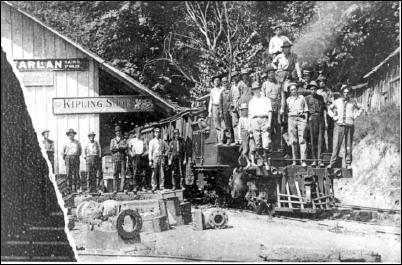
Workers pile on steam engine of "Calico Road"
train, likely headed for Cairo 17 miles away
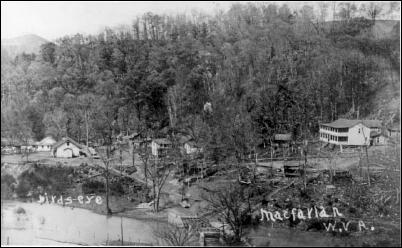
Macfarlan's historic Beechwood Hotel shown far right, with
a new bridge being built at bottom center, you can see the
RR warning cross above the bridge where the road crosses
the tracks with the train station above the words "birds eye"
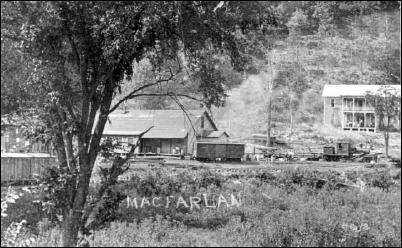
Macfarlan's narrow-gage train station to the left
and one of hotels shown to right, circa early 1900s
By Bob Weaver 2007
Photos compliments of Gail Gillespie
Macfarlan, Ritchie County, was once described as a charming town on the historic 180-mile Staunton-Parkersburg Turnpike.
Macfarlan and nearby Dutchman are said to have been named from an 1769 visit of a party of ten white men, which included explorers Jesse and James Hughes, an Englishman by the name of Macfarlan, and a Dutchman, whose actual name has been missing from the written account.
The Turnpike, commissioned in 1826 to help open access to the Northwest Territory. Constructing was started about 1840. The local stretch is best known to residents as Route 47, through Gilmer, Ritchie, Wirt and Wood counties.
Being a stop on the historic road, Macfarlan once had train and barge traffic bringing in supplies for the oil and gas companies and local residents.
The town had two hotels, the Dogwood and the Beechwood, and several stores including the W. R. Hayes Trading Company and the F. J. Lemon Store, in addition to a blacksmith shop, taverns and other amenities.
Accommodating overnight travelers on the Staunton-Parkersburg Turnpike, the town developed a reputation for road houses and saloons to satisfy the region's appetite for social life.
Stories abound about bawdy behavior at Macfarlan's road houses, those ruckus days often more remembered than the historic and vibrant life of the community. A number of law enforcement officers shot and killed.
To offset the lack of moral turpitude, the community developed a number of active church congregations.
Even the famous Monsignor Thomas Quirk (1845-1937) of Lewis County, known as "Padre of the Mountains," traveled to the fledgling town in 1873 to bring the gospel to Catholic followers.
Macfarlan was like a frontier town, with "dust on my saddle, blood on my boots" survivors - rough and tumble, with the taming influence of the church for the Irish and German immigrants who came to the area. Many are buried in the Oxbow Cemetery a few miles away.
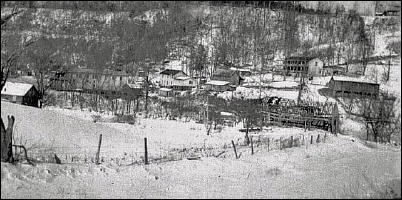
Photo taken from an area near the Macfarlan School,
looking closely through the trees you see the store
at the right of the store and above it, you can see
one of the hotels, the 2nd hotel is near the right,
just to the left of the barn, and to the far right
at top you can see the Jenkins house at top of hill
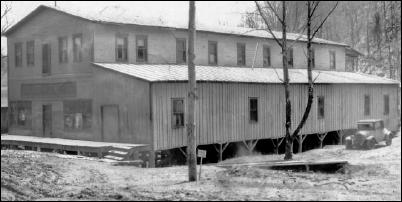
Likely the back of Harry Lemon's store
facing the Macfarlan Creek Road
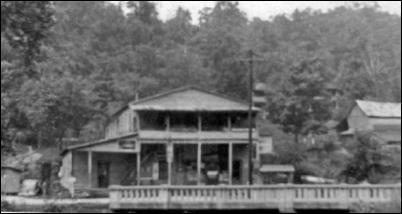
Rt 47 front of Harry Lemon's store
The narrow gage train known as "Calico Road" once connected Macfarlan with Cairo, 13 miles away. The train, likely built in the late 1800s, had its last run on November 22, 1929.
Nearby is the famous Ritchie Mines, known for its crystallized oil or asphalt, found in one other place in the world.
The Ritchie "lode" was discovered in 1852, and brought investors and workers to test and mine the vast deposits of crystallized petroleum, much like mining coal.
The deposits were described as a freak of nature, with the commercial use fading when "real" oil was discovered and pumped from the earth. Now, with the high price of oil, extractors are looking at the "lode" again.
Today, there are a few skeletons of the old structures, remaining is the church, a country store and a few houses.
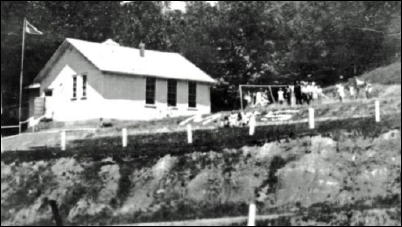
The Macfarlan School
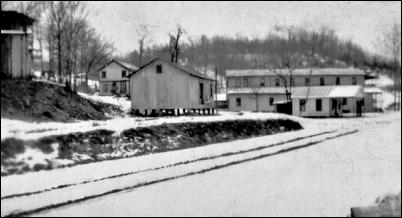
Macfarlan 1936 - Big changes from earlier photos, the
building closest to center was probably where train
station was once located, noting the small service
station before the Smith's expanded the operation
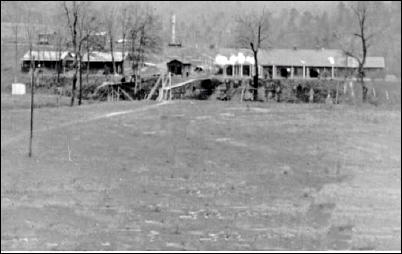
South Penn Plant was just east of Macfarlan on Rt 47
and has since been torn down, a compressor station that
ran 24/7, with the Macfarlan ball field in the foreground
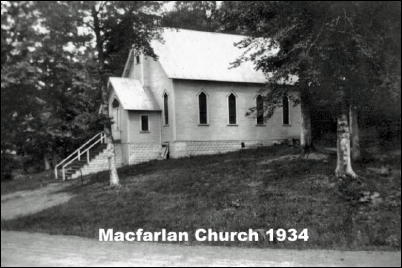
Macfarlan Church was at one time in Cairo,
torn down and brought to Macfarlan and rebuilt
- Gail Gillespie, who contributed photos and information for this article, was born in Macfarlan in 1933. After completing Ritchie County Schools at Harrisville in 1952 he moved from the area and is now living in Parkersburg.
Read other stories on the Herald about the
Ritchie Mines and Staunton-Parkersburg Turnpike